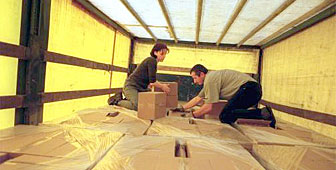EU and Switzerland tackle customs fraud

Switzerland and the European Union have started formal talks aimed at combating cross-border crime. The negotiations are part of a new round of bilateral treaties being negotiated between Bern and Brussels.
Cross-border crime and fraud are among the most controversial issues under discussion between Switzerland and the 15-member EU. Brussels wants the Swiss to clamp down on cigarette smuggling, which is treated as a customs offence in Switzerland.
Daniel Eckmann of the Swiss finance ministry said Switzerland was prepared to help find a solution swiftly to combat customs fraud. “It is not in our interest to tolerate fraud or to be a centre for organised crime,” he told swissinfo.
However, Eckmann said any deal must be compatible with the Swiss legal system. He added that the government was willing to improve legal assistance in cases of smuggling, even when the goods in question do not pass through Switzerland.
“Our proposal would help combat all the cases of smuggling organised by people in Switzerland and which have come to light in recent years,” Eckmann said.
The EU, however, insists on a more comprehensive solution. It is seeking an agreement aimed at clamping down on all illegal activities which harm the EU’s financial interests.
Despite their apparent differences, Eckmann said he was convinced that both sides were interested in settling the issue quickly. He said it was too early to set a timeframe.
On Wednesday, Swiss and EU delegations held a first day of negotiations on trade in processed agricultural products, such as chocolate, sugar, cereals and pasta.
Addressing a news conference in Brussels, the head of the Swiss delegation, Willy Tinner, said both the EU and Switzerland would benefit from a further reduction in trade restrictions, including prohibitive customs duties.
The Swiss want to extend the list of products to coffee, alcoholic drinks, mineral water and herbal medicines. Besides the multinational conglomerate, Nestlé, the Swiss food industry is comprised of more than 120 mainly small and medium-sized companies.
The EU also stands to benefit from an agreement, according to Tinner, because Switzerland is the second biggest export market for agricultural products from the EU.
As part of the second set of bilateral accords with the EU, further negotiations are scheduled in September on statistics and environmental issues.
Switzerland is seeking agreements on a total of 10 dossiers, including cooperation on security and asylum. The EU for its part is pressing for an agreement on tax evasion and the lifting of Swiss banking secrecy in particular.
Last year Swiss voters approved a first set of bilateral accords with the EU, but ratification has been held up by several EU member states.
by Urs Geiser

In compliance with the JTI standards
More: SWI swissinfo.ch certified by the Journalism Trust Initiative

You can find an overview of ongoing debates with our journalists here. Please join us!
If you want to start a conversation about a topic raised in this article or want to report factual errors, email us at english@swissinfo.ch.